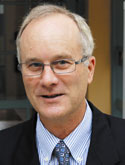 Research Chair in Urologic Pain and Inflammation Staff Urologist, Department of Urology, Kingston General Hospital
Research Chair in Urologic Pain and Inflammation Staff Urologist, Department of Urology, Kingston General Hospital
Ontario, Canada
Dr. Curtis Nickel, a clinical researcher and urologist, is the international “go-to” guy for inflammatory diseases of the urinary tract. Before he embraced the challenge of working on these difficult conditions, in research terms, they had lingered in the shadow of urinary cancers.
For almost two decades, Dr. Nickel has devoted his research efforts to what he calls “three main opuses” – benign prostatic hyperplasia (BPH), chronic prostatitis and interstitial cystitis. The first two conditions affect the prostate gland in men, causing urinary discomfort; the latter is a major cause of pelvic pain in women.
His scientific contributions to this field have put these diseases “on the map”, bringing them to the attention of urologists across North America. In April 2009, he was awarded the American Urologic Association’s coveted Distinguished Contribution Award for his significant body of work in the field of chronic pelvic pain in men and women.
“My research started with looking at BPH,” he says. “That led me to look at another ignored prostate disease – prostatitis. This infection or inflammation of the prostate affects as many as 5% of Canadian men.”
Prostatitis affects younger men. Men with this painful prostate condition usually have to take time off work, and many become totally disabled. According to Dr. Nickel, prostatitis has a greater impact than BPH and prostate cancer, “yet we’ve basically ignored it.”
Interstitial cystitis, also known as painful bladder syndrome, affects about 3% to 4% of Canadian women. “These women have suffered for a long time,” says Dr. Nickel. “They are often relegated to the periphery of clinical practice, because there is no surgical treatment.”
The women suffer the pain and agony of urinary tract infections without an infectious cause.
“These are bad conditions, and nobody in Canada was doing any research on them, so that’s what I picked.” When he started to work in these fields, clinical practice was based primarily on anecdotal information, clinical experience and almost no research.
He and his colleagues decided to make it their life’s work to look more closely at these diseases. Over the years, they have made great strides in developing medical therapies to help patients with BPH, and their work has helped to improve the management of patients with chronic urologic pain.
In clinical trials and as a practicing urologist, Dr. Nickel works with real people who have these diseases. Standard therapies cannot cure them and only ameliorate symptoms in a few, so Dr. Nickel and his research teams try to differentiate and classify patients, “so we can decide which is the best treatment for each one of these conditions.”
Over the last 15 years, he has brought scientific clinical methodology to the field “to the point where now the research, particularly in prostatitis and interstitial cystitis, is evidence-based.”
His research in chronic pelvic pain has built a new awareness of these diseases, updated their classifications and definitions, helped to validate new treatment approaches, and established new diagnostic paradigms. His work has shaped the evolution of medical therapy in this field.
Dr. Nickel is one of the few independent researchers in Canada to challenge the claims of herbal remedies head on. “Herbal therapies for these conditions are based on testimony, anecdotal reports and advertising and promotion,” he says.
“I felt that it was worth the effort to bring the proper clinical scientific methodology to the field to be able to examine the real benefits and risks of the various herbal therapies that are used so routinely by our patients.”
When his research began, no other Canadians were working in these fields. “The only way that we were going to have any success, to make any sort of progress, was to work with international collaborators,” he explains. “I’ve been extremely successful in being able to put together wonderful international collaborations.”
Dr. Nickel has organized and been invited to participate in joint research efforts in the United States, Europe, and Asia. “These collaborations have put together the complex network of researchers that was required to make the type of breakthroughs that were necessary to advance these fields.”
He wrote the medical textbook on prostatitis. He has lectured in over 35 countries. Dr. Nickel serves on the review panel of a number of granting agencies and is on the editorial boards of several national and international urological journals.
His research is partly funded by concurrent grants from the U.S. National Institutes of Health (NIH) and U.S. National Institute of Diabetes and Digestive and Kidney Diseases (NIDDK). In 2007, he was the first Canadian urologist to receive a Tier 1 Canada Research Chair in Urologic Pain and Inflammation.
Dr. Nickel was born and completed his urological undergraduate, surgical, and research training in Canada. “My biggest challenge as a clinical researcher over the years has been to stay the course and not throw up my hands and say, it’s easier just to be a doctor or a surgeon and take care of patients.”
The significant support of Queen’s University, Kingston General Hospital and his colleagues in the Urology Department has helped him to “find the time for research.”
